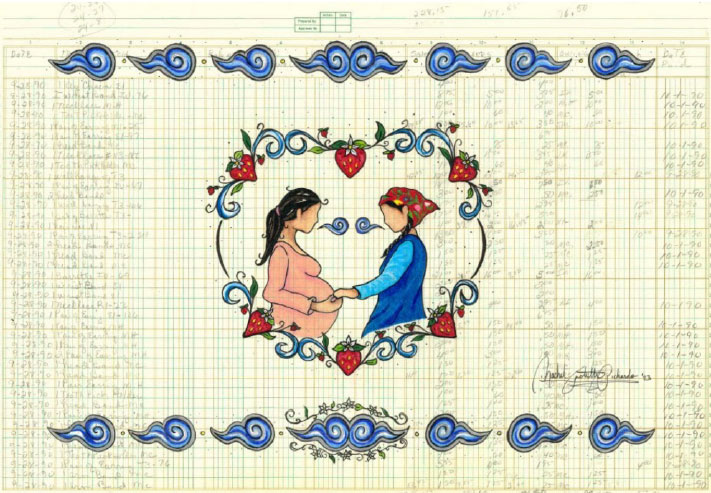Cultural Safety
Family Care Space Program
The purpose of creating this guide to establishing Family Care Spaces at Indigenous cultural events is rooted in fostering inclusivity, preserving family cultural traditions, and promoting community well-being.
Recognizing the significance of family bonds within Indigenous communities, this guide provides helpful recommendations and strategies for implementing and designing Family Care Spaces that cater to the unique needs of caregivers and their children during cultural events. By offering practical insight into planning, design, and cultural considerations, this guide seeks to enhance the overall experience for families, ensuring they feel supported and valued. Additionally, this guide emphasizes the importance of community engagement, acknowledging the collaborative effort of Indigenous Community programs and members to ensure the success and sustainability of Family Care Spaces.
This guide serves as a resource to empower Indigenous Communities in creating environments that not only accommodate the diverse needs of families but also honor and celebrate Indigenous family values.
Select the link to download the Indigenous Family Care Space Planning Guide.
Indigenous Doula Training Program

Artwork: Breathe by Rachel Twoteeth-Picardo
Created for the MOMS Indigenous Doula Training Program
Doulas are a critical resource in supporting birthing people and families as they navigate pregnancy and the postpartum period. Indigenous doulas play an especially important role in supporting families as they provide education on peripartum concerns as well as encourage traditional practices and ceremony. Revitalization of Indigenous birth work is a key component in improving health outcomes for Indigenous peoples; recentering birth work is a foundation of Indigenous sovereignty and has the potential to counter systemic barriers that disproportionately impact our tribal communities and improve overall community health.
To learn more about doulas and doula initiatives in Montana, please visit the Healthy Mothers Healthy Babies Doula and Birthworkers webpage.
Safe and Inclusive Care Training Program
The MOMS Program is committed to elevating maternal healthcare and cultural safety in Montana. The following collection of materials have been curated by and created for Montana professionals serving pregnant and postpartum patients and families to increase capacity to provide culturally safe, trauma-informed care. This series seeks to improve perinatal care delivery through acknowledgement, respect, validation, and integration of patients’ individual perspectives, cultures, identities, values, beliefs, and abilities.
Improving Perinatal Care for Indigenous Families Part 1
Select the link to view the presentation recording.
Presented by:
Amy Stiffarm, PhD, MPH
Healthy Mothers, Healthy Babies – the Montana Coalition
Improving Perinatal Care for Indigenous Families Part 2
Select the link to view the presentation recording.
Presented by:
Amy Stiffarm, PhD, MPH
Healthy Mothers, Healthy Babies – the Montana Coalition
Allyship vs. Appropriation
Select the link to view the presentation recording.
Presented by:
Amy Stiffarm, PhD, MPH
Healthy Mothers, Healthy Babies – the Montana Coalition
Trauma Informed Care for Perinatal Care Teams
Select the link to view the presentation recording.
Presented by:
Lisa Kirkland, MA, AMFT
Associate Marriage and Family Therapist
A Trauma-Informed Approach: Systemic Change to Support Perinatal Trauma-Informed Care
Select the link to view the presentation recording.
Presented by:
Lisa Kirkland, MA, AMFT
Associate Marriage and Family Therapist
Indigenous Health Policy
Select the link to watch the presentation recording.
Presented by:
Donald Warne, MD, MPH
Co-Director – Johns Hopkins Center for Indigenous Health
The Impact of Poverty on Indigenous Health
Select the link to watch the presentation recording.
Presented by:
Donald Warne, MD, MPH
Co-Director – Johns Hopkins Center for Indigenous Health
Integrating Traditional and Modern Medicine
Select the link to watch the presentation recording.
Presented by:
Donald Warne, MD, MPH
Co-Director – Johns Hopkins Center for Indigenous Health
Annie Belcourt, PhD
Native American Studies Chair – University of Montana
Challenges in American Indian Health Professions Education
Select the link to watch the presentation recording.
Presented by:
Donald Warne, MD, MPH
Co-Director – Johns Hopkins Center for Indigenous Health
It is the hope of the MOMS Program that healthcare organizations will include these materials in their learning management systems (LMS) to provide broader access to these materials for provider teams serving perinatal patients and families. We do ask that individual presenters and MOMS be provided appropriate credit when this series is disseminated. Please include the MOMS funding disclaimer when sharing these resources.
Example:
Title: Cultural Safety: Improving Perinatal Care for Indigenous Families
Presenting Author: Amy Stiffarm, PhD
Link: dphhs.mt.gov/ecfsd/moms/CulturalSafety
This video is part of the Safe and Inclusive Care Training Program created by the Montana Obstetric and Maternal Support (MOMS) grant demonstration project at Billings Clinic through a contract with the Montana Department of Public Health & Human Services (DPHHS). The Health Resources and Services Administration (HRSA), Department of Health and Human Services (HHS) provided financial support for the Siloed documentary series through an award of $10 million. The contents are those of the author. They may not reflect the policies of HRSA, HHS, the U.S. Government, DPHHS, or the Montana State Government.
Cultural Immersion Day Program
In partnership with Yarrow and Healthy Mothers, Healthy Babies – the Montana Coalition (HMHB-MT), MOMS implemented the Cultural Immersion Day Program. The Immersion Day Program is a strengths-based, relationship-centric model designed to drive system-level quality improvements in non-Indigenous health facilities that serve Indigenous communities. MOMS works with Tribal Nations and their health programs to develop immersion opportunities in which staff from non-Indigenous birthing facilities are brought to Tribal Nations to develop relationships with community supports, hear stories of Elders, and visit local referral partners to open a dialogue with their Tribal Nation counterparts.
MOMS hopes these relationships will foster improved coordination of care for Indigenous maternity patients by increasing access to trauma-informed obstetric care and referrals to culturally appropriate, community-based outpatient supports.
The following Immersion Days have been hosted to date:
- Fort Belknap Indian Community | Aaniiih and Nakoda – May 2024
- Crow Tribe of Montana | Apsáalooke – June 2024
- Northern Cheyenne Tribe – July 2024
Select the link to learn more about the Cultural Immersion Days on the Montana Perinatal Quality Collaborative website.

